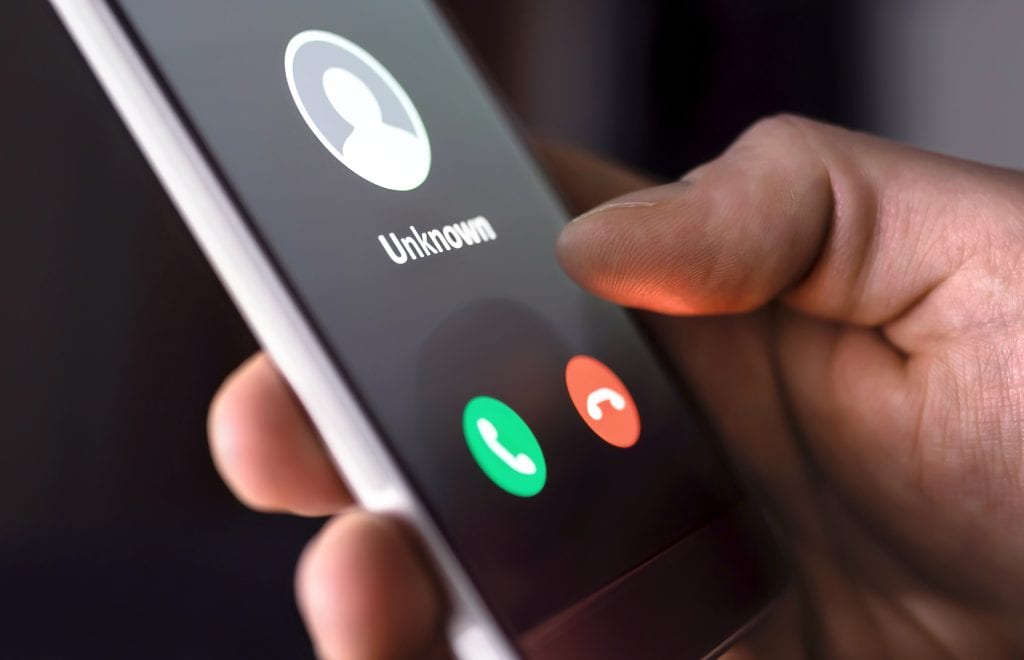- browse by category
- Audit Assistance
- Business and Taxes
- Celebrities in Tax Debt
- Cryptocurrency Taxes
- Economic News
- Foreign Banking
- Innocent Spouse
- IRS debt settlement
- IRS Headlines
- IRS Wage Garnishment
- Marriage & Divorce
- Payroll Tax
- Retirement
- Revenue Officers
- State Tax Headlines
- Stop IRS Debt
- Success Stories
- Tax and Politics
- Tax Attorney
- Tax Codes
- Tax Debt Help
- Tax Evasion
- Tax Levy
- Tax Lien
- Tax Payment Plans
- Tax Return Filing
- Tax Tips

Did you just get a call from the IRS?
Perhaps a recorded voice claimed to be an IRS agent, told you about some overdue taxes you haven’t paid yet, and then threatened you by saying you’d be arrested or your Social Security number would be canceled?
We’re glad you double-checked to verify, because that’s a scary call to receive.
It’s also completely fake.
No matter how threatening or real the call may have sounded, the IRS didn’t call you. They never have and they never will! The longer the message can trick you into staying on the phone, the more time they have to try to convince you to fall for the latest tax-related phishing scam to hit phones across the U.S.
We’re going to give you a full rundown of this latest phone-based tax scam, from where it came from and how to spot an IRS scam call to what you should do if you think you’re being scammed.
Origins of the Tax Scam
Nobody’s all that new to robocalls. We’ve probably all gotten at least one.
The same lack of online privacy that is responsible for most robocalls is responsible for this newest tax scam. Between our data providers, apps, social media sites, and advertisers, our phone numbers have found their way all over the internet.
It’s way too easy for scammers to get their hands on your contact info—your name, your phone number, and your email address—these days. Any scammer with the right equipment and a plan can easily get what they want: A listening ear.
Spotting the Newest Tax Scam
This latest phone scam has everything to do with your Social Security number, and its goal is to get you to call them back. Here are a few ways to spot one of these phishing calls, according to the IRS.
Typically, the call will include claiming that you have overdue taxes then threatening to cancel your SSN if you don’t call back. They may also threaten to arrest you! And if you initially don’t answer the phone because you don’t recognize the number, they’re likely to leave a voicemail.
To Sum Up: A scammer will claim you haven’t paid your taxes and threaten to cancel your Social Security number.
Now that you have a basic idea of what to watch out for in a phone scam call, you should be able to spot a scam pretty easily. Here are some other actions the IRS won’t take:
- They won’t call. Don’t take it personally; the IRS will reach out to you about any tax debts by mail.
- They won’t demand payment via methods like wire transfer, iTunes gift card, or wire transfer. iTunes gift cards are pretty much worthless to the government.
- They won’t threaten to have you arrested. Yes, it’s scary. But the IRS will never call the cops on you to collect a tax debt.
- They won’t request you pay any person or organization besides the U.S. Treasury. If they direct you to somebody else, it’s probably a scam.
- They won’t require you to pay right away. They IRS always gives you the opportunity to question or appeal the amount you owe. It’s your right.
How to Handle a Tax Scam Call
The IRS had to put out a warning about these scam calls, which means they’re extremely common. Should you end up on the receiving end of one of these phishing calls, here’s what to do.
- Don’t give out your personal information on the phone, and if they leave a voicemail, don’t return the call. That’s exactly what they want.
- If you don’t have a reason to suspect you owe taxes, report the call. Send the information you have to the IRS, Treasury Inspector General, or the FTC. Check out the full instructions here.
- If you think you may owe taxes, contact the IRS. Call the IRS directly or check out your tax account info here.
Stay Two Steps Ahead of Tax Scams
The best way to beat a tax scammer is by staying up-to-speed on their latest tricks and spreading your newly found knowledge around. You’ve gotten a good start by reading this blog post, but your work doesn’t end there. Send this article to a friend or family member, practice basic phone safety practice, and stay safe from scams!
Of course, if you really are dealing with tax debt, we can help. You shouldn’t have to fear scammers, and you shouldn’t have to fear the IRS. Give us a toll-free call today to get started.
Leave Comments

Top Tax
secrets revealed
Sign up for our newsletter and be the first to find out when exciting IRS news happens. Yes, exciting. We're really into taxes.


